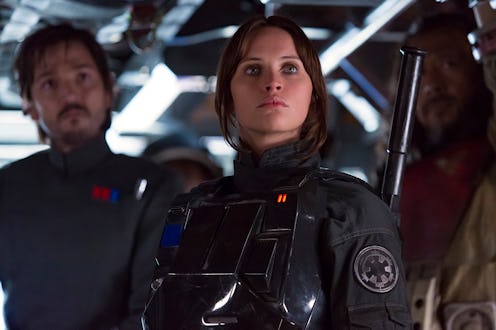
It's been days since I saw Rogue One for the first time, and I've only stopped thinking about it to answer professional emails and order food. The first standalone film in the new Star Wars Anthology spin-off series has me that shook, in no small part because of that ending. (Do I even need to say this? This essay is all spoilers, baby.) It's one thing to be blindsided by an ending that's a genuine shock. But the Rogue One conclusion could be seen from a full Kessel Run away and it still landed hard. The entire Rogue One crew perished in the battle on Scarif, because they had to. And that ending makes Rogue One the most emotionally weighty Star Wars movie ever.
Jyn Erso, Cassian Andor, Chirrut Îmwe, Baze Malbus, Bodhi Rook, and K-2SO were doomed by the timeline. If any one of them had lived, how could Rogue One have explained why they're not fighting alongside the other rebels in the next phase of the old Republic's resistance? Would they retire after one successful mission to live peacefully in some far corner of the universe? The entire movie is about these people deciding for their own individual reasons to risk absolutely everything — including their lives — to stop the spread of Fascism in the galaxy. Realistically, they wouldn't stop until they either died or won. So unless another remastered edition of the classic trilogy would add in a CGI Jyn blasting stormtroopers next to Princess Leia, survival just doesn't work.
This ending was predetermined in many ways. But was it also effective? I say yes, submitting the anecdotal evidence of all the tearful faces that drifted out of the theater after my screening. War is right there in the title of this franchise. And war has casualties. Sacrifice is written in to Rogue One right from the beginning. Galen Erso gives up his family to stand against the Empire; he makes sabotaging his enemies and employers his life's work. He dies knowing that he's done everything he can, even though he lived out his years as a prisoner. And that moment when Cassian rallies his brothers-in-arms to offer their help to Jyn is so moving because they're signing up for a mission that has very little chance of success, with or without the support of Alliance leadership.
Rogue One is an example of really beautiful storytelling, especially how it transitions immediately into the minutes leading up to the start of A New Hope. That momentum is key. Brave people died to move the ball forward, and look what their work has made possible. It's also a strong argument for the continued expansion of the Star Wars universe. If you keep widening the lens, more and more stories come into focus. Those stories can inform the ones that have already been told. This new context turns A New Hope into a deeper movie. With Rogue One's "rebellions are built on hope" refrain, even the title has another layer of meaning.
I won't be able to watch any of the trilogy films ever again without thinking about what these early rebels gave up to keep the rebellion afloat. The Rogue One ending transforms the entire franchise. That's how powerful it is.